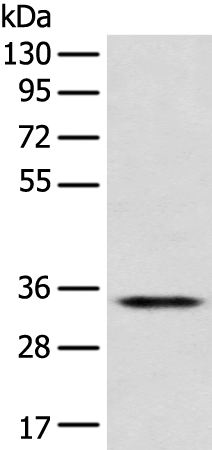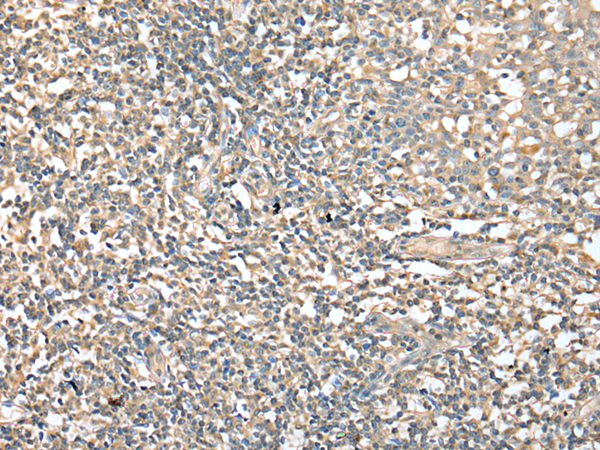

| WB | 咨询技术 | Human,Mouse,Rat |
| IF | 咨询技术 | Human,Mouse,Rat |
| IHC | 1/25-1/100 | Human,Mouse,Rat |
| ICC | 技术咨询 | Human,Mouse,Rat |
| FCM | 咨询技术 | Human,Mouse,Rat |
| Elisa | 1/5000-1/10000 | Human,Mouse,Rat |
| Aliases | R3; CD1A |
| WB Predicted band size | 38 kDa |
| Host/Isotype | Rabbit IgG |
| Antibody Type | Primary antibody |
| Storage | Store at 4°C short term. Aliquot and store at -20°C long term. Avoid freeze/thaw cycles. |
| Species Reactivity | Human |
| Immunogen | Fusion protein of human CD1D |
| Formulation | Purified antibody in PBS with 0.05% sodium azide and 50% glycerol. |
+ +
以下是3篇关于CD1D抗体的代表性文献摘要:
---
1. **标题**:*CD1d-restricted and TCR-mediated activation of Vα14 NKT cells by glycosylceramides*
**作者**:Kawano T, et al.
**摘要**:该研究利用抗CD1D抗体阻断实验,证实CD1D分子向NKT细胞呈递糖脂抗原(如α-半乳糖苷神经酰胺)的作用,揭示了CD1D抗体在抑制NKT细胞激活中的关键机制。
2. **标题**:*Structural basis for CD1d presentation of a sulfatide derived from myelin*
**作者**:Zajonc DM, et al.
**摘要**:通过X射线晶体学分析CD1D-磺酸酯复合物结构,并利用特异性抗体定位CD1D的抗原结合域,阐明了抗体如何干预脂质抗原呈递过程。
3. **标题**:*Anti-CD1d monoclonal antibody inhibits autoreactive T cell activation and ameliorates lupus in murine models*
**作者**:Yang JQ, et al.
**摘要**:研究显示,抗CD1D单克隆抗体通过阻断自身抗原呈递,显著减轻小鼠系统性红斑狼疮症状,提示CD1D抗体在自身免疫疾病治疗中的潜力。
---
以上文献涵盖CD1D抗体的功能机制、结构基础及治疗应用,均发表于高影响力期刊(如*Science*、*Immunity*)。如需具体发表年份或DOI,可进一步补充检索。
CD1D antibodies are tools used to study the CD1D protein, a member of the CD1 family of antigen-presenting molecules. Structurally similar to MHC class I proteins, CD1 molecules specialize in presenting lipid and glycolipid antigens to specific T cells, such as invariant natural killer T (iNKT) cells. CD1D is expressed on antigen-presenting cells, including dendritic cells, B cells, and intestinal epithelial cells, and plays a critical role in bridging innate and adaptive immunity by activating iNKT cells through lipid antigens like α-galactosylceramide (α-GalCer).
CD1D antibodies are widely used in research to detect CD1D expression via flow cytometry, immunohistochemistry, or Western blot, and to modulate CD1D-mediated immune responses. They help investigate CD1D’s involvement in autoimmune diseases (e.g., multiple sclerosis, rheumatoid arthritis), infections, and cancer. In cancer, CD1D-restricted immune responses can exhibit dual roles: promoting tumor immunity via iNKT cell activation or suppressing it through regulatory mechanisms. Recent studies highlight CD1D’s potential as a therapeutic target, with antibodies being explored to block immunosuppressive interactions or enhance lipid antigen presentation.
Research also focuses on CD1D’s non-classical functions, such as its role in metabolic regulation and mucosal immunity. Understanding CD1D biology remains crucial for developing immunotherapies and deciphering its complex contributions to immune homeostasis and disease pathogenesis.
×